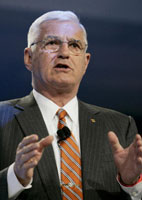 Top international experts meeting in Rome last week agreed that bioenergy could be a positive force for rural development
Top international experts meeting in Rome last week agreed that bioenergy could be a positive force for rural development
According to a news release from the Food and Agriculture Organization (FAO) it was the first time that experts in bioenergy, food security and the environment came together to discuss the environmental and food security impact of the rapidly-expanding bioenergy industry.
Alexander Müller, head of FAO’s Natural Resources Management and Environment Department, said, ‘While there is legitimate concern among some groups that bioenergy could compromise food security and cause environmental damage, it can also be an important tool for improving the well-being of rural people if governments take into account environmental and food security concerns.”
During the meeting, Luiz Augusto Horta Nogueira is Professor at the ‘Universidade Federal de Itajubá’, Brazil said some crops are more productive than others when it comes to making ethanol and biodiesel.
“The conflict between food and fuel should be evaluated under this point of view,” he said. “If you are considering the good options you have in wet, tropical countries this conflict is not so serious.” He says that sugarcane for ethanol and palm oil for biodiesel are more efficient than corn and soybeans.
Listen to interview here:  FAO Energy 1 (2 min MP3)
FAO Energy 1 (2 min MP3)
Seth Shames, Policy Program Manager of the Washington-based Ecoagriculture Partners says bioenergy could have great benefits for small farmers in countries such as Africa and Central America.
“We’re excited about potentials for growing biofuel crops, trees or even perennial grasses in the future, which could be used by small farmers for their own energy needs to integrate in the food landscape also so they don’t have to make this trade-off and also increases livelihood options for them,” he said.
Listen to interview here:  FAO Energy (2 min MP3)
FAO Energy (2 min MP3)
 The vice chairman of General Motors says converting automobiles to ethanol is “entirely realistic.”
The vice chairman of General Motors says converting automobiles to ethanol is “entirely realistic.”

 Scientists have used an SDSC supercomputer to help improve cellulose conversion to ethanol.
Scientists have used an SDSC supercomputer to help improve cellulose conversion to ethanol.  Top international experts meeting in Rome last week agreed that bioenergy could be a positive force for rural development
Top international experts meeting in Rome last week agreed that bioenergy could be a positive force for rural development 
 The latest update from explorer/environmentalist Will Steger comes from Earth Day (this past Sunday) on Baffin Island in the Canadian Arctic. As you might remember from our previous posts, Steger is leading a team of three other explorers and educators and four native Inuits on a four-month-long, dog-sled expedition across the island.
The latest update from explorer/environmentalist Will Steger comes from Earth Day (this past Sunday) on Baffin Island in the Canadian Arctic. As you might remember from our previous posts, Steger is leading a team of three other explorers and educators and four native Inuits on a four-month-long, dog-sled expedition across the island.
 Kansas City consumers can follow in the footsteps of the IndyCar® Series and make a choice at the pump for energy independence and cleaner air. E10, a blend of 90 percent gasoline and 10 percent ethanol, will be available for $2.14, the average qualifying speed for the Indy 300 at Kansas Speedway, on Thursday at two locations in the greater Kansas City metropolitan area and #17 Team Ethanol Driver Jeff Simmons will be signing autographs.
Kansas City consumers can follow in the footsteps of the IndyCar® Series and make a choice at the pump for energy independence and cleaner air. E10, a blend of 90 percent gasoline and 10 percent ethanol, will be available for $2.14, the average qualifying speed for the Indy 300 at Kansas Speedway, on Thursday at two locations in the greater Kansas City metropolitan area and #17 Team Ethanol Driver Jeff Simmons will be signing autographs. The
The  EPA Administrator Stephen L. Johnson calls the nation’s first comprehensive Renewable Fuels Standard, or RFS, “a hat trick – it protects the environment, strengthens our energy security, and supports America’s farmers.”
EPA Administrator Stephen L. Johnson calls the nation’s first comprehensive Renewable Fuels Standard, or RFS, “a hat trick – it protects the environment, strengthens our energy security, and supports America’s farmers.”